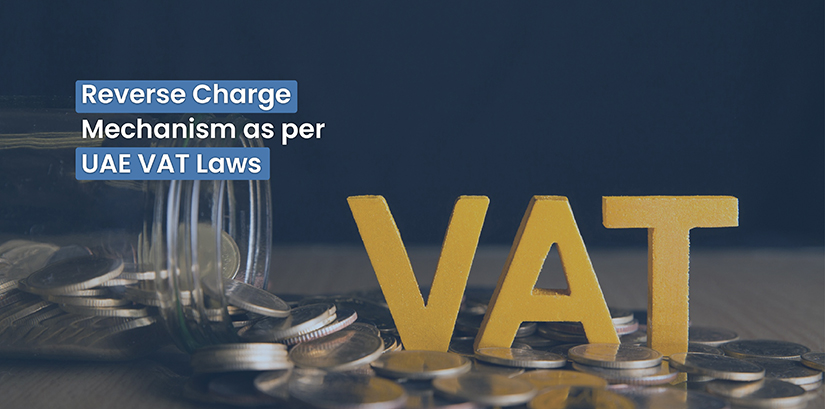Reverse Charge Mechanism as per UAE VAT Laws
- October 25, 2023
- Posted by: admin
- Category: Value Added Tax

The Reverse Charge Mechanism, also known as RCM, is a significant provision within the framework of the UAE VAT laws. It essentially shifts the responsibility of VAT payment from the supplier to the recipient of goods or services. This mechanism is typically applied in scenarios where the supplier is not based in the UAE or is not registered for VAT purposes in the country. Consequently, the registered businesses receiving such supplies are obliged to account for the VAT themselves, ensuring compliance with the UAE’s VAT regulations. The mechanism is primarily employed for cross-border transactions.
What Is A Reverse Charge Mechanism (RCM) In VAT?
The Reverse Charge Mechanism (RCM) in VAT refers to a system where the responsibility for reporting a transaction’s VAT shifts from the seller to the buyer. In this scenario, the buyer is obligated to declare and pay the VAT to the tax authorities instead of the seller. This mechanism is typically applied in situations where the seller is not based in the country or is not registered for VAT purposes. The RCM helps to ensure that the VAT obligations are met even when dealing with transactions involving non-compliant sellers.
How Does RCM Work In UAE?
The operational process is simple and straightforward. Suppose a VAT-registered business in the UAE imports specific goods and services from a UK-based company. As the UK company is not registered for VAT in the UAE, they are not required to pay VAT for the transaction. Conversely, the UAE-based company must document the transaction and settle the VAT payment, which is then remitted directly to the Federal Tax Authority (FTA) or the government.
Many companies struggle to fulfill these requirements due to a lack of fundamental knowledge. They often neglect to document these transactions in their VAT returns, leading to non-payment of the reverse charge VAT. Such situations can lead to severe consequences, potentially causing significant trouble for the company. The most effective way to address these issues is by engaging the renowned VAT consultancy services in UAE. BRISK VAT experts will accompany you throughout the process, ensuring compliance and avoiding potential pitfalls.
Applicability Of The Reverse Charge Mechanism Under UAE VAT Law
The VAT regulations in UAE outline particular situations and transactions where the reverse charge VAT applies. Individuals or businesses that have made purchases outside the UAE will need to account for reverse VAT payment to the Federal Tax Authority (FTA).
Import From Another GCC Country
The reverse charge mechanism applies when you provide goods or services from another GCC country. The supplier should not have any business presence in the UAE, and they must be based in another country to meet the criteria.
Supply Of Gold And Diamonds
The supply of gold and diamonds falls under the category of goods subject to the reverse VAT mechanism.
- Selling gold and diamonds
- Buying gold and diamonds for resale or further production/manufacture
Further Conditions
Further conditions where transactions are subject to the reverse charge VAT mechanism are detailed below:
- Buying goods from a designated zone
- Selling hydrocarbons for resale by a registered supplier to a registered recipient in the UAE
- Selling crude or refined oil by a registered supplier to a registered recipient in the UAE
- Selling processed or unprocessed natural gas by a registered supplier to a registered recipient in the UAE
- Producing and distributing any form of energy sold by a registered supplier to a registered recipient in UAE
The reverse charge mechanism does not apply to the export of gold and diamonds, the supply of investment precious metals (platinum or gold with purity greater than 99% tradable in global markets), and the export of products primarily consisting of gold or diamonds.
How Would Recipients Deal With The Reverse Charge Transaction?
Recipients typically handle reverse charge transactions by ensuring they accurately record these transactions in their accounting records. They need to calculate the VAT amount owed and include it in their VAT returns. The recipient is responsible for paying the VAT directly to the tax authorities. Compliance with the necessary documentation and reporting requirements is essential in managing reverse charge transactions effectively
What Are The Requirements For The Reverse Charge Mechanism?
- The receiver of the goods or services needs to be VAT-registered.
- Every registered business owner should maintain accurate records of their supplies that involve the reverse charge.
- Invoices, receipt vouchers, and refund vouchers must clearly indicate whether the tax for that specific transaction is being handled through the reverse charge mechanism.
Consider Professional Guidance For Handling VAT-Related Affairs!
Reverse Charge Mechanism (RCM) can be intricate, requiring professional insight aligned with the UAE’s VAT regulations. BRISK provides guidance on comprehending the Reverse Charge Mechanism in the context of VAT.
For any queries or clarifications regarding RCM VAT in UAE, reach out to BRISK. We specialize in various aspects of VAT, including VAT registration, VAT return filing, VAT audit, VAT refund, VAT accounting, and VAT deregistration.


